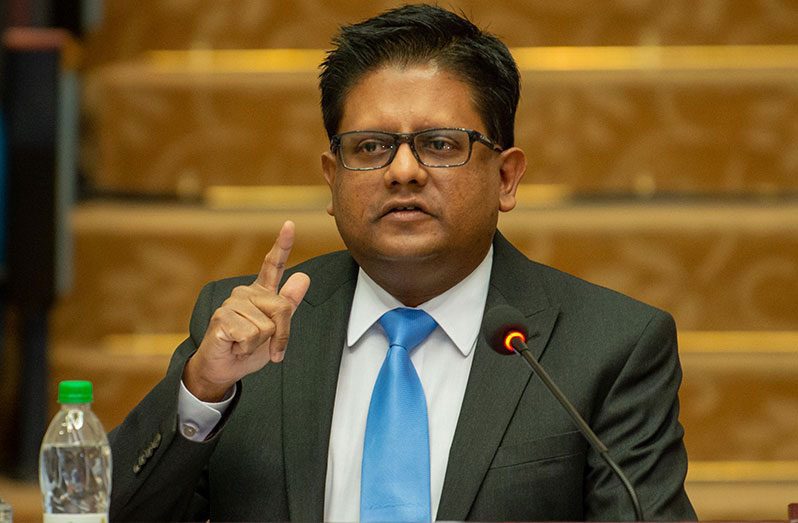–Dr Singh says, lauds IDB group’s commitment to continued support for small Caribbean States
THE period of recovery from the pervasive COVID-19 pandemic presents an opportunity for the region to transform the existing development model in order to better address challenges facing various stakeholders, Senior Minister in the Office of the President with responsibility for Finance, Dr Ashni Singh, has said.
“Recovery from the pandemic presents an opportunity to transform the development model of the region, while enhancing climate resilience, strengthening the capacity of public institutions, and supporting private institutions in making meaningful contributions towards attaining the 2030 agenda for sustainable development,” Dr Singh said during his address to stakeholders at the annual meeting of the Board of Governors of the Inter-American Development Bank (IDB) and IDB Invest, on Monday.
The senior minister who was speaking on behalf of The Bahamas, Barbados, Guyana, Jamaica and Trinidad and Tobago, said the COVID-19 pandemic resulted in one of the worst recessions in the Latin America and Caribbean (LAC) region in a century, causing a seven per cent decline in regional GDP in 2020 — the largest regional contraction in the world.
He lamented that for some of the countries in the Caribbean, the contraction was much sharper, especially in the tourism-dependent economies of the sub-region.
Dr Singh added that even though LAC’s economy is estimated to have grown by 6.8 per cent in 2021, this growth has not been balanced.
“The largest expansion is estimated in Central America at 7.7 per cent, followed by the Andean sub-region at 6.3 per cent, and the Southern Cone at 6.2 per cent. On the other hand, the Caribbean is expected to have a milder recovery at 1.9 per cent, reflecting the acute vulnerabilities we face in the sub-region, even as we are all committed to working towards achieving a more robust recovery,” he said.
The senior minister went on to say: “This, coupled with increasing maturing debt, implies amplified gross financing needs. For the Caribbean, the threat of a protracted financial crisis lingers as tourism remains subdued and climatic events increase in frequency and intensity.
“Consequently, our governments are faced with difficult decisions on prioritizing interventions to stimulate a recovery, support reforms to unlock economic potential, catalytic projects to enhance development prospects, and initiatives to build resilience against the increasing threats of climate change.”
It is against this background that it is crucial for the IDB group to maintain its Small and Vulnerable and Small and Island Country targets to ensure that support is granted to the countries which require the most assistance in grappling with the economic crisis.
He lauded the commitment of the IDB group for its continued support to the Caribbean sub-region.
“The bank’s instruments to support our countries in achieving our development agendas are crucial and must remain agile to respond to mounting needs in this volatile environment. Therefore, the Caribbean welcomes the proposal to adjust the instruments on offer.
“We particularly wish to highlight the important role of PBLs (Performance-based loans) in supporting integral reforms at this critical juncture and support the call for PBL caps to be made more flexible. We also welcome the proposal to exclude green PBLs from counting against the PBL cap,” Dr. Singh said, adding that guarantees will be key in mobilising private resources to contribute to confronting emerging development challenges and delivering on the 2030 agenda.
He said that the regional stakeholders recommend that emphasis be placed on incentivising the use of guarantee instruments.
“We also take this opportunity to express support for the strategic climate change and sustainability facility that will provide new concessional resources for climate action in the Caribbean,” Dr Singh said.
Dr Singh concluded by encouraging the IDB group’s management to fulfil their pledge to develop a sub-regional strategy for the Caribbean, with emphasis on health, education, infrastructure, private sector development, the digital economy, climate change, the “blue” economy, and the “orange” economy.
He also encouraged the bank to move with alacrity in delivering support at the scale needed, on both the public and private sector sides of the group’s operations, to facilitate a sustainable recovery in the Caribbean and to help the sub-region embark on a path towards lasting economic growth and prosperity.
The minister then reiterated the strong appreciation of the Caribbean for the support provided by the IDB to the sub-region over the years, as well as the importance of the group to the development of Latin America and the Caribbean, in particular. He added that the bank remains the premier strategic partner of choice in member countries.




.jpg)










